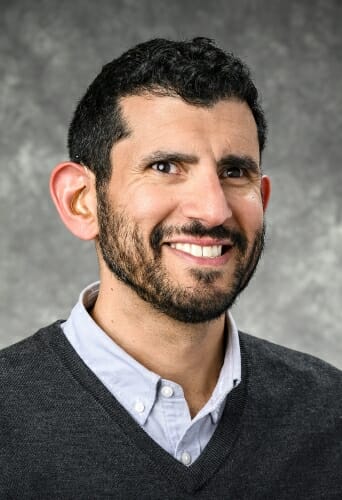New website provides a central location for campus accessibility answers
We all play an important role in making UW–Madison an inclusive university, and disability is an important facet of the diversity within our community. You may wonder: How can I help make the university more inclusive to our community members with disabilities?
A new website that centralizes the university’s disability and accessibility resources in a single location — Accessibility@UW–Madison — answers that question. The goal of the site is to ensure faculty, staff and students have access to the tools and resources to fulfill the university’s shared responsibility for creating an inclusive, accessible environment. This site replaces the current Accessibility page (accessed from the quick link menu on wisc.edu) and will serve as the main destination for accessibility information.
At first, UW–Madison’s Americans with Disabilities Act (ADA) coordinator, Ruben Mota, conceptualized the new website as a single webpage to host training opportunities on disability. However, when doing some initial research and working on the university’s Digital Accessibility Policy, he says it became apparent that “a single webpage of training wouldn’t be as effective as a central website hub for the university community to access disability and accessibility information they need for their day-to-day work in support of inclusion.”
In early 2021, with support from the Office of Compliance’s leadership, Mota partnered with the Center for User Experience in the Division of Information Technology (DoIT). “We set out to create an easy-to-locate resource that individuals could visit at any time when planning their physical or virtual events or when creating digital resources to make them accessible,” said Mota.
“I am hopeful this website will continue to raise awareness about the ways disability is shaped by how we design our university and not necessarily one’s own physical or mental health condition,” Mota says. “If we can intentionally design inclusively, from a human perspective and with critical accessibility attributes in mind, then we can more effectively ensure everyone — regardless of being abled or disabled — has independent access instead of relying on a reasonable accommodation to address a physical or digital barrier. This is one of the reasons why this website emphasizes our collective role in creating inclusion.”
Partnering with DoIT allowed Mota to create a user-friendly website. The Center for User Experience is also a central resource at the university for human-centered design and digital accessibility and a key stakeholder and content contributor to the site. Mota and the Office of Compliance recently co-led a refresh of the university’s Web Accessibility Policy with the center, leading to the approval of UW–Madison’s Digital Accessibility Policy in November 2021. Accessibility@UW–Madison followed, with Mota and user experience architect Christine Anderson collaborating.
In the spirit of the new policy, the website emphasizes that accessibility can only be achieved if we all contribute. Visitors to the site will find a robust selection of guides, such as the university’s list of accessible building entrances and how to host an inclusive hybrid meeting, in addition to training, services, contacts and other resources to understand their responsibilities and opportunities to create a more inclusive campus.
“This website affirms our university’s belief that we build a better institution by valuing the contributions of everyone,” says Chancellor Rebecca Blank. “My leadership team supports this website, because every Badger plays a role in creating an accessible environment for their UW–Madison community.”
“While this phase of the website project is complete,” Mota says, “any department can contact me to share other university-based resources they believe should be included in the website. “It truly takes all of us to design inclusively.”
Special thanks to the Employee Disability Resources Office, McBurney Disability Resource Center, UW Libraries, Accessible Technology Advisory Group, FP&M, Badgers for Special Olympics, the Committee on Disability Access and Inclusion, and the Disability Studies Initiative for their feedback and work on this project.





